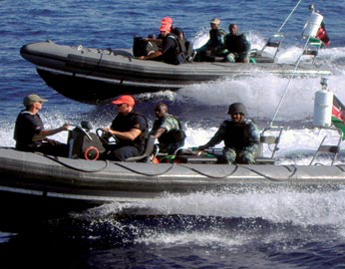Will anti-piracy in Somalia be privatised?

The private firm Drum Cussac could form the Somali anti-piracy force. And the British Foreign Office has been involved in discussions with her. This is what the Sunday Telegraph reveals (read here).
Contact group plan
Drum Cussac, well established in the currently very lucrative market of private protection of ships, is headed by a former officer of the Scots Guards, Jeremy Stampa Orwin, and employs many former members of the Special Boats Service (the combat swimmer unit and British naval commandos).
Deputy Foreign Office chief Chris Holtby, who also chairs part of the international anti-piracy contact group, met with them as part of his overall plan to strengthen the fight against piracy in Somalia. . This would also cover the “intelligence against pirate bases" that the "preparation of actions against them“, or sending trainers “if the authorities are unable to stop the kidnappings“. This project would be financed mainly by the American government, which is putting $25 million on the table. And British funding would be provided, indirectly, via the “Rule of law, counter-terrorism and migration” line. But the creation of a Somali coast guard force – with 8 boats, 96 sailors and a battalion of 130 Marines responsible for reconnaissance and offensive action – is for the moment suspended, following disagreements between the province Autonomous Puntland and the Somali Transitional Government (GFT), on the composition of this force.
A Dreamline bis case
This project raises certain difficulties. Firstly, the risk of going from policeman to bandit is proven. It seems that some current pirates (at least the management) were able to be trained by training financed with international funds; training that was interrupted when funds stopped. Thus the coastguards, who had begun to be trained by former British SAS, ended up using their training and their uniform to capture a Thai fishing boat and demand a ransom of $800.000. On the other hand, it is reminiscent of the Sandline affair, named after the firm accused of having broken the arms embargo on Sierra Leone, and in which the Foreign Office was allegedly involved. Our colleague from the Sundya Telegraph mischievously recalls that Stampa Orwin shared his offices with Sandline… when he worked at Lifeguard.
For the moment, unfortunately, no solution other than those of private forces is popular. Because no country really wants to risk men in Somalia (the French still have a hostage, from the DGSE, detained for almost 18 months now).
